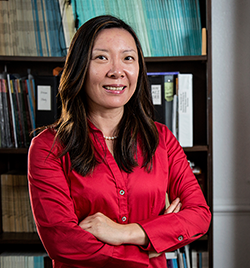News & Events
Psychologist’s cancer study awarded $1.5 million NIH grant
Dr. Qian Lu leading study on Asian-American breast cancer patients and survivors

Increasing the quality of life for all women living with cancer is one motivation for a five-year study led by psychologist and physician Qian Lu and funded with a $1.5 million grant from the National Cancer Institute at the National Institutes of Health.
Entitled “Joy Luck Academy: A Culturally Sensitive Social Support Intervention,” the study is the first randomized controlled trial to assess the impact of a culturally based social support program among Chinese-American breast cancer survivors.
Support groups and other psychosocial interventions have been shown to be effective for the mainstream population of breast cancer survivors, but few psychosocial interventions have been successfully designed for ethnic groups of color, said Lu, an associate professor in the Department of Psychology.
“There was no study in this area, so we really don’t know what kind of intervention would work for Asian-American breast cancer survivors. This is really the first one,” she said.
The study follows 210 Chinese-American women recently diagnosed with breast cancer who actively participate in a support group called the Joy Luck Academy or JLA. The name honors the The Joy Luck Club, the bestselling novel by Amy Tan and the Hollywood film based on it about Chinese-American women and their Chinese immigrant mothers living in San Francisco. The mothers meet regularly to eat, play mahjong, talk about their daughters, and share stories about the triumphs and tragedies that shaped their lives.
“Despite their own challenges, the women in the Joy Luck Club were happy when they were together and they would guide each other on their journey,” Lu said.
“This name, JLA, developed by our research and community-based partner the Herald Cancer Association is very appropriate for our peer mentor support program,” she said. “We are essentially bringing women together to guide each other on a shared journey.”
The women enter the study as newly diagnosed breast cancer patients. They are assigned a peer mentor, who is also a graduate of JLA and a cancer survivor, for eight weeks.
The peer mentor provides information necessary to cope with a cancer diagnosis, such as how to read and comprehend a pathology report, assess treatment options, design an appropriate exercise schedule, and adjust daily diets to get the nutrition needed to fight the disease or accommodate the side effects that accompany treatment.
But the mechanics of surviving cancer are more complex than gaining an understanding of the medical and physical interventions. The JLA peer mentors also provide “emotional and experiential support from a mentor who is a breast cancer survivor, adjusted well and knows what you need to do to move beyond cancer,” said Lu.
Her study will assess whether social support improves quality of life, and reduces depressive symptoms, fatigue and stress among women who have a breast cancer diagnosis.
“If the JLA is effective and improves the well-being among Chinese-American breast cancer survivors, the model may be disseminated as an effective, low-cost intervention for other groups of Asian-American breast cancer survivors across the country,” Lu said.
She and her team conducted a pilot study and the results of that trial were published in November in the Oncology Nursing Forum.
The preliminary findings include Chinese-American women with breast cancer expressing feelings of loneliness and hopelessness and perceiving themselves as being stigmatized because of the disease. But after participating in JLA, the women said they were able to open up and talk about their own experience as normal lives. They found they had mentors to look up to and peers with whom they could share their experience.
“This is actually huge because it’s not that easy to reduce depressive symptoms,” said Lu.
Lu uses two sets of measures in the research study. One is based on self-reporting on various objectives and assessments through self-reporting. The other involves taking eight saliva samples in two days to measure the levels of cortisol in their saliva, which is an indicator of their level of stress. Lu wants to see how the cortisone changes as a result of participating in JLA.
“As a trained physician in China, I could help patients by saving a life, but there were a lot of conditions that were chronic and I couldn’t get rid of the illness,” Lu said. “The key is to help patients have a better quality of life as a whole person, not just as a patient.”
- by Melissa Carroll